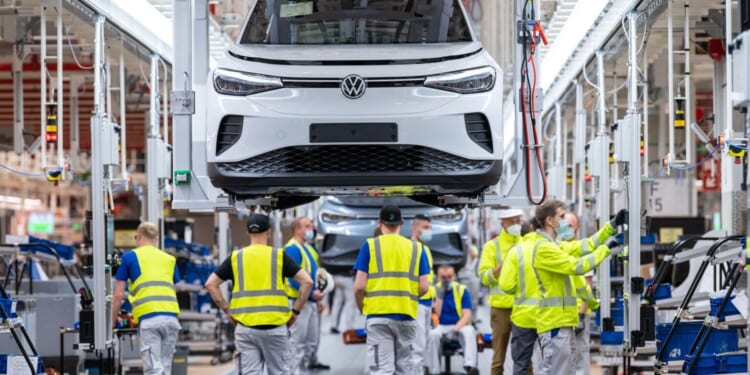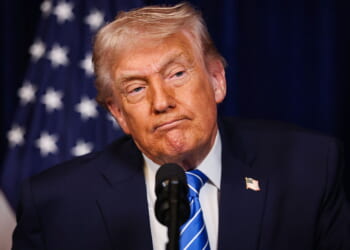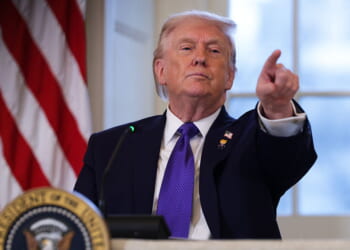Germany is in shock. In late October, Volkswagen announced it would have to halt production of its Golf range at its flagship Wolfsburg plant – which employs 60,000 people – because of a shortage of Chinese-produced semiconductor computer chips. Suddenly, the depth of Germany’s dependency on China and its own economic failures were made painfully clear.
The immediate trigger for this crisis was the effective nationalisation of chip manufacturer Nexperia by the Dutch government, on national-security grounds. Nexperia is owned by Wingtech, a Chinese company that is based in the Netherlands, but which was blacklisted by the US Department of Commerce last year. In response to the Dutch government’s decision, China blocked the export of most of Nexperia’s ‘basic’ chips, which in turn affected those reliant on them, including Volkswagen.
It is now being reported that China has lifted export restrictions on the chips, as well as the materials used to make them. Nevertheless, this incident has exposed how reliant Germany’s industrial core has become on low-cost, mass-produced Chinese semiconductors. Volkswagen may have narrowly avoided a wholescale shutdown, but the situation in which it found itself has certainly set alarm bells ringing.
Above all, it shows that German industry is now clearly, chronically, dependent on China – for chips, rare earths and other raw materials. Roughly 70 per cent of global rare-earth production is done in China, which also controls most processing technologies.
In Germany, like other Western countries, this reliance on China was originally celebrated as part of globalisation. The ‘dirty’ and energy-intensive aspects of production were sent to other countries, while we in the West congratulated ourselves on being ‘clean-energy superpowers’. But we never asked what it would mean to lose control over the foundations of our own industry, and now we’re beginning to find out.
The reliance on Chinese production is only one part of Germany’s economic problems. Germany’s car industry, once the pride of its economy, is today rapidly losing ground to Chinese competitors in the electric-vehicle market.
No wonder the issue of deindustrialisation has now come to the fore in German politics. Even mainstream economists, who might once have dismissed the threat of deindustrialisation as populist fearmongering, now admit it’s becoming a real problem. Indeed, the data are now irrefutable. Manufacturing as a share of GDP has fallen well below 20 per cent, a decline of more than five per cent in the past 10 years. Industrial jobs are vanishing at an unprecedented rate, with 114,000 lost last year alone. And two-in-five industrial companies plan to cut investment in Germany.
The real tragedy is that this is entirely an act of self-harm. Incredibly, Germany’s governing class still refuses to admit to these failures. For years, Berlin lulled itself into thinking it could export its way out of every crisis – on the back of Chinese demand, a weak euro and cheap Russian gas. And all the while, it was sleepwalking into dependency and decline. Germany is now reaping the consequences.
The establishment’s most reckless decision of all was abandoning nuclear power at the start of the 2010s. In chasing ‘green’ prestige, Germany’s elites promoted expensive, unreliable renewable energy at home, while pretending that this would not affect its industrial base. German electricity costs are now the highest in the EU, and energy-intensive sectors are fleeing abroad as a consequence. Yet the political class, across all major parties except the right-wing AfD, still clings to this failed energy policy.
It’s worth pointing out that corporate leaders were complicit in this act of self-sabotage. Former chancellor Angela Merkel decided to abandon nuclear power after the Fukushima nuclear accident in Japan in 2011 – an accident that killed no one, caused by a combination of an earthquake and a tsunami. Yet rather than challenge Merkel, most business leaders stayed silent. The price of their silence is now visible everywhere, from shuttered factories to exorbitant energy costs.
Nothing illustrates the folly of Germany’s political and business elites more than the demolition of the Gundremmingen nuclear plant in Bavaria at the end of last month. This facility was once central to Bavaria’s economic might, supplying a quarter of the region’s electricity. According to one American study, it could have been reactivated and delivered electricity to over 30million households. But politicians had other ideas.
Germany’s real problem isn’t China per se – it’s the incompetence of its political leaders. Germans shouldn’t just worry. They should be furious.
Sabine Beppler-Spahl is spiked’s Germany correspondent.

















